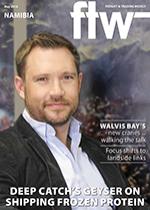The Walvis Bay Corridor Group (WBCG) is focusing on the implementation of the Namibia Logistics Masterplan, according to acting chief executive officer Clive Smith. “For the next five years the focus will be on establishing Namibia as a logistics hub.
This focus will allow us to streamline our operations, and to put more energy into implementing the Masterplan,” he told FTW. The Masterplan, which was supported by the Japan International Cooperation Agency (Jica), seeks to help Namibia to “go beyond the limits of the small domestic economy by utilising economic growth in the whole southern African region,” and “to exit from the dual structure economy” which the plan states is “overly dependent” on the mining industry.
Five elements contributing to the success of the logistics hub concept are identified in the Masterplan – an efficient port, adequate storage facilities, an efficient transport network, the presence of international logistics companies, and removing bottlenecks at the border posts.
With work on the port of Walvis Bay’s new container terminal nearing completion, and with the roads in Namibia being among the best in the region, the focus is now on rail, warehousing at strategic junctions on the Walvis Bay corridors, attracting and retaining more shipping lines and international logistics operators, and ensuring the smooth flow of cargo through the border posts. In order to meet the need for warehousing a campaign to encourage investment in logistics hubs in transport centres such as Walvis Bay, Grootfontein, Rundu and Okahandja is also under way.
The WBCG is also encouraging Zimbabwe, Zambia and Botswana to make greater use of their dry port facilities in the port of Walvis Bay. Further opportunities and challenges are expected to be identified in the first Namibian State of Logistics report, which is due to be published in November.
A comparison of the Walvis Bay corridors with alternatives in the region will enable shippers to have a better idea of the costs of the full logistics chain, which include delays at borders, port productivity and real transit times, he says.
The WBCG is monitoring political and economic trends in the region as well as internationally and has plans to open offices in Europe and Asia to complement those in Brazil, DRC, South Africa and Zambia.
INSERT AND CAPTION
The WBCG has plans to open offices in Europe and Asia. – Clive Smith

